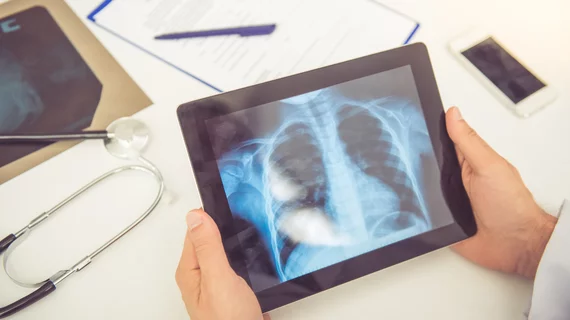Radiologists see positives with ‘remote readouts’ and potential staying power in post-COVID future
The global pandemic has forced radiology departments to rethink traditional workflows. And one such institution in Boston has implemented a way to maintain effective training programs through socially distant "remote readouts."
Physicians with Brigham and Women’s Hospital’s Department of Radiology relocated workspaces outside of reading rooms so trainees could still collaborate with attendings to review imaging exams. The program has replaced commonplace side-by-side collaboration, an important process for trainee growth.
Overall, trainees and attendings say the experience has been positive, with the potential for improvement. Authors of the study, published May 23 in Academic Radiology, believe some aspects of the program may even become permanent.
Responses to an anonymous survey from both sides highlighted the program’s benefits related to aspects of social distancing, technology, and autonomy, according to first author Shanna A. Matalon, MD, with Brigham and Women’s, and colleagues. She added that “as we look forward to when we can return to the reading room side-by-side, it may be beneficial to retain elements of remote readouts for integration in the post-COVID future.”
Beginning in early March, radiologists from 14 conventional reading rooms were relocated to 36 workspaces across the hospital system. The effort established one- or two-person reading “pods” utilizing communication technology infrastructure for remote-trainee exam readouts. After three weeks, Matalon et al. sent out an open-ended, two-question survey asking participants to list the pros and cons of the new program.
Overall, 37% and 47% of trainees and attendings responded, respectively. Comments tended to be more positive (60%) than negative, with trainees offering up such feedback in 65% of cases. By comparison, attendings provided 135 comments, 65% of which were also positive.
Both parties say the remote pods effectively promoted social distancing, but most negative comments were related to perceptions of increased isolation. A systemwide committee now completes weekly videoconference events to share wellness resources.
Attendings and trainees both found the program improved the latter’s sense of independence and competency—it was the only theme rated positively by both groups. This may be one aspect implemented in the post-COVID era, the authors wrote
“This model may facilitate graduated responsibility for senior trainees, to review asynchronously a larger number or more complex exams,” they added. “Trainees still benefit from attending feedback, in the context of greater trainee autonomy and a supervised experience of post-training clinical practice.”
There were a number of limitations in this research, and the authors noted that they did not evaluate whether there was a difference in quality or accuracy of reports generated during remote readouts compared to traditional, side-by-side interpretations.

